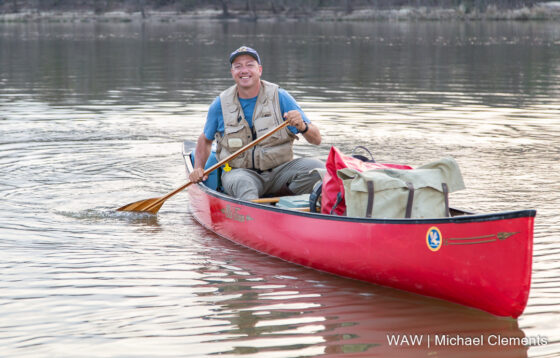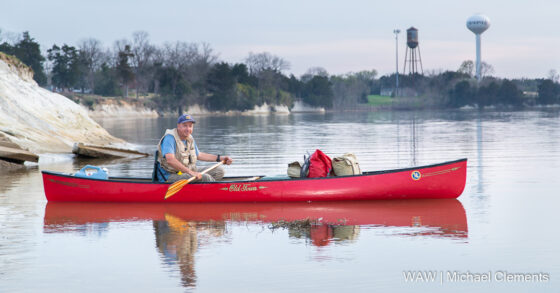Journey of rivers bring canoer to Demopolis
A journey of two years, 22 rivers and 100 towns brings Neal Moore to Demopolis.
The 49-year-old sometimes journalist, self-proclaimed “internationalist” and chronicler of mid-America is paddling his way across America from Astoria, Oregon to New York City harbor. Along the way he is taking the advice of another canoer.
“Slow down. It’s not a race. You’re passing through historically important areas,” Dick Conant once told Moore as he was trying to portage his canoe quickly. “Take the time to step off the river.“
The Los Angeles native is doing just that. He stepped off the river in Demopolis last week.
“Part of this journey is asking people if they’re familiar with the history beneath their feet and if their family is a part of that history,” Moore said.
He is gathering experiences and stories along the way that eventually will become a book, one that he began organizing during his stay here.
Moore’s interest in people began at an early age, set off by tragedies. When he was 13, he lost his older brother. His busy parents sent him to live with cousins in the summer, so he traveled to Oahu, Hawai’i and to England.
When his mother became ill, her dying wish was for him to become a missionary. “She wanted me to transform myself into something pure.”
He readily admits he’s not missionary material, but the idea of traveling to new places and learning about the people who lived there while helping them struck his fancy.
“I put religion to the side,” he said, but added, “I really like the idea of Christian service.”
At the age of 19 he signed up to work in South Africa. During the 17 months he was there the country went through a crucial time in its history, between Nelson Mandela’s release from prison and his ascension to power.
“I was lucky to be there in history.” Moore was one of the first white people who was allowed by the government to move into a Black township.” During his stay he worked with AIDS patients and helped residents dig home gardens.
The experience took him out of his comfort zone. “When you put yourself out, that’s when you learn and when you grow.”
During the next 30 years Moore lived off and on all over the world, but primarily in Africa and East Asia. In fact, he gets his mail at a P.O. Box in Taipei, Taiwan.
“When you live overseas for quite some time… on your own free will (you) take in, soak up the rhyme and reason of societies in the world.”
As an expatriate there is a point “when you step across that threshold and become a citizen of the world.”
When Great Recession hit 11 years ago, he was abroad. All the news stories were financial and focused on large businesses. He believed the real story was in middle America. “People have grit, and they’re going to have practical advice” on how to survive.
He began to entertain the idea of canoeing across the country. To paddle the Mississippi was “a really big deal.”
He tried this journey in 2018 and made it through 1,800 river and portage miles to North Dakota. He had to pause his trip and then realized he would have to start all over.
Moore took a year to put a map together of his planned journey. He travels in an expedition canoe that is 16 feet by 35 inches. It has wheels that go under the canoe to make it easier to portage, and after being strapped in a harness, “I pull like a donkey.”

He found that he is not the first person to canoe across the country. In 1890, 22-year-old R. Elbert Rappleye paddled east to west. No one until Moore has done it west to east solo.
“I’m not doing it to be a first – if I make it,” he joked.
Moore is stepping outside of his comfort zone again with this journey. He’s never been to the southeastern part of the country, “and I’m so excited to be here listening, documenting and learning.”
His second try began in February 2020, just a month before the COVID-19 pandemic hit. The first of what he refers to as the acts of his journey, called “To the Divide”, found him paddling against the current a lot of the way, “the wrong way,” west to east and having to portage his canoe and gear when he couldn’t navigate the waters.
At Helena, Mont., he began the second act, “To the Big Easy,” and joined the Missouri River which took him to the Mississippi River. It was “such a pleasure after coming uphill.”
The third act, “To Lady Liberty”, began in New Orleans. He went through Ocean Springs and then found himself stringing the Barrier Islands where he saw his first “moondown” early one morning.
From Demopolis he will travel the Tenn-Tom Waterway to the Tennessee and the Ohio rivers to Pittsburgh, with side trips to see friends. Then Moore plans to paddle the Allegheny, portage to Lake Erie, travel the Erie Canal, Seneca, Mohawk and Hudson rivers to the Statue of Liberty.
Moore in the past has earned his living as a freelance journalist, contributing to the New Yorker Magazine, Der Spiegel and CNN.
“I love the idea of sharing,” he said, “to have the chance to step into a community and when a story hits, to be able to share that experience.”
But he stresses this journey for the life experience, not for the book.
To get a feel for a community, “I like to walk the streets,” he said. “Certain things sort of stand out.” He looks for the rhyme and reason and history of an area.
In Demopolis he has found “how the history comes alive in a place like this, looking forward by embracing the past,” he said. Demopolis “is beckoning.”


